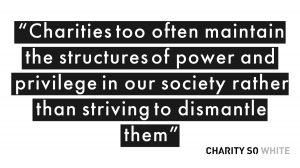Fundraising is described to be an important aspect when it comes to humanitarian help. It is comprehensible, without money, any attempt to help communities in need is doomed to fail. When it comes to fundraising, there are reports that underline that many NGOs surprisingly get up to 55 % of their money foundations through the earned income derived from the sales of various products such as cookies, books, cards etc. In some cases, NGOs have a partnership with big companies where they can get their part of earnings from investments or business operations. The remaining 45 % comprise of 32 % that come from governmental funding programs or the public sector and 13 % from the private sector, including foundations, corporations, or persons. However, it is surprisingly the private sector that generate the bigger percentage of the funding. The private sector often includes groups or individuals, wealthy enough to give, emphasising the expression “Givers give”. It is also common that a board of members to raise money for fundraising and is involved in the decision-making of the organisation.
Although NGOs or other humanitarian organizations seem to have a noble cause, it has been reported that racism, discrimination, and mistrust toward their local partners or organizations occur specifically when it comes to fundraising matter. In some situations, the aforementioned circumstances might imply the fundraising procedure as a white privilege.
Obviously, the local partners are frustrated and demand to be involved in NGOs decision-making process of projects regarding their own communities. The logic of it is simple “who knows best what´s best for me?” The obvious question one might ask: Why such a mistrust and obvious inequality comes from NGOs when it comes to fundraising and finance matters?

Some local practitioners in the aid sector have speculated that the aforementioned issues are due to a series of factors that contribute to the inequality between the Western donor countries and the recipient countries.
There is a fact of so called “mistrust “when it comes to invest or providing direct funds to the involved local partners with the assumption that corruption or lack of experience might affect the projects outcomes. The misconception that recipient countries are not qualified, not to be trusted and need a “guidance and supervision from the donors” is in fact an action of racism, discrimination, reminiscent of former colonial relations.
In the following blogs I will discuss and try to analyze how local organizations or partners have experienced that “funding gap”, in an attempt to raise awareness or “decolonize” the question of fundraising in the aid sector.

